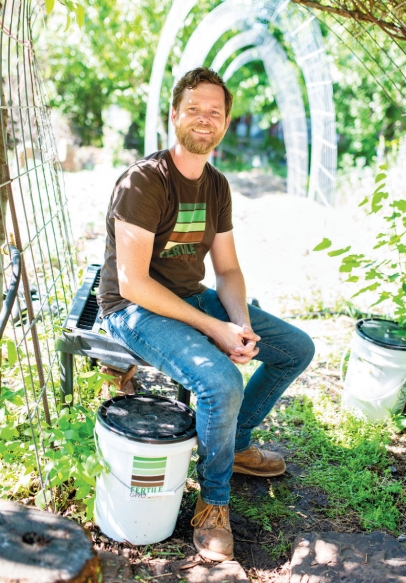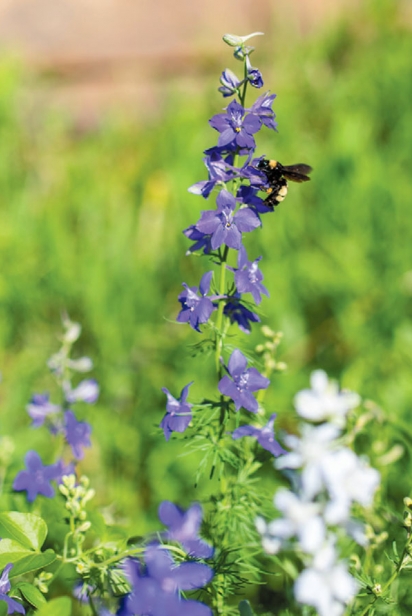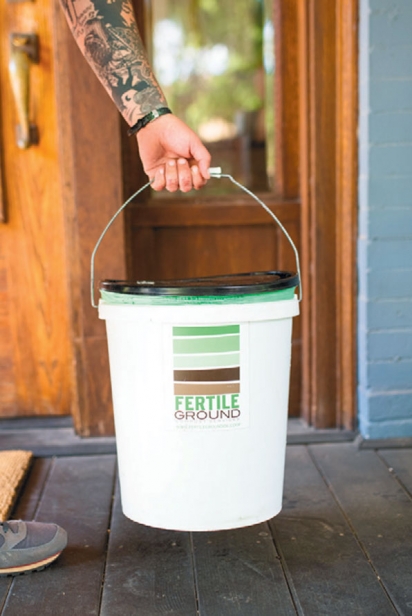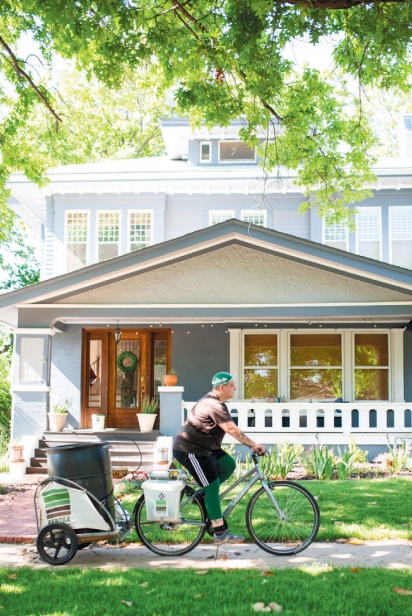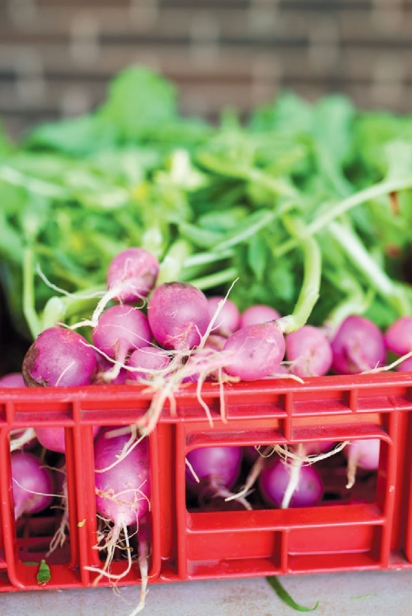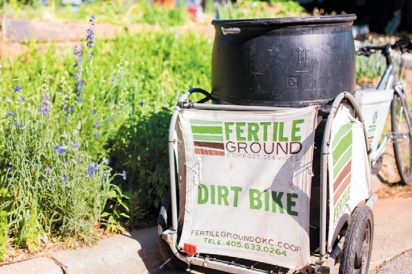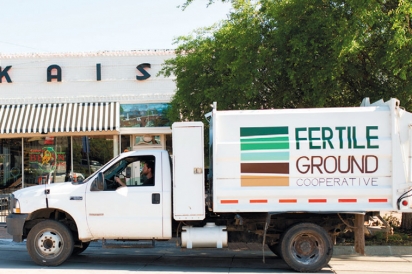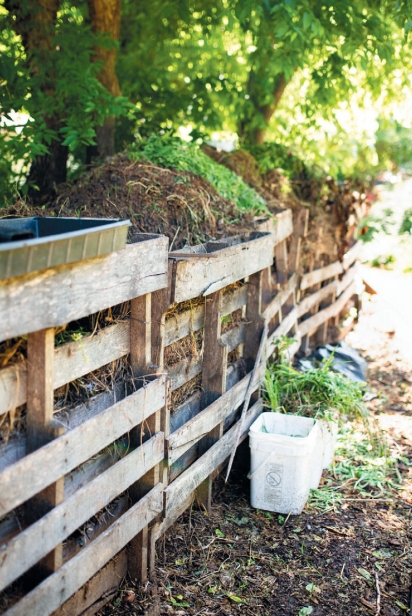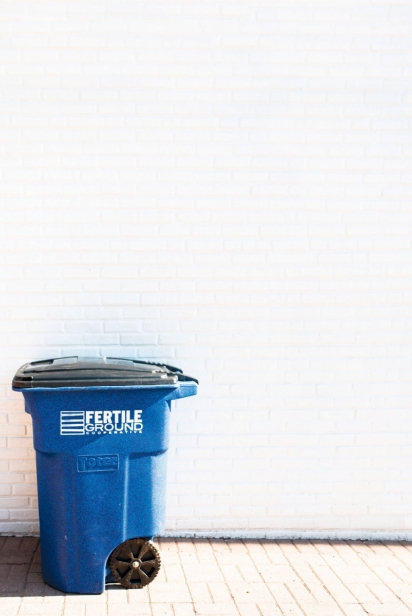Fertile Ground
I have the most terrible memory. If it’s not written down, it does not happen. I have a hard time with names. I often don’t remember things that happened a year ago, let alone things from when I was a child. But I have this distinct memory of being very young and watching a Sesame Street episode with a split screen of a kid brushing his teeth on one side and a fish in a pond on the other. The kid didn’t turn off the water while he brushed his teeth and the water on the fish’s side of the screen simultaneously became lower and lower until the fish was left with barely enough water. That was the day that I became an environmentalist.
And now that I have a child of my own, I worry even more about what this world will look like when my daughter is my age. What will it look like for her children? This is something that weighs often on my mind, but it can be hard to know how to make a difference when the problem seems so big. Terry Craghead with Fertile Ground Cooperative offers some doable and important ways to help.
Company Name: Fertile Ground Cooperative
Your Name: Terry Craghead
Website: Fertilegroundok.coop
When did you start your business? December 2011
Tell us a little about what your business does.
Our mission at Fertile Ground is to improve and protect our social and natural environment through environmentally beneficial services and worker-owned jobs. We provide Commercial Recycling and Composting Services for offices, restaurants, churches, apartments, and condos in OKC and Norman.
We provide Residential Compost Collection. We pick up your food scraps weekly, compost them at our site or at a community garden compost site, and provide customers with a portion of compost in return. We have some bike collection routes near downtown, midtown, and uptown. You can find a complete service area map on our website. We also provide Zero Waste Event services. We consult with you to help make your event a green event and we also provide bins, bags, signage, and labor to manage your event. And on top of that, we also manufacture Compost Filter Sock, which is an erosion control device used in construction and homebuilding that uses compost to keep our lakes, streams, and rivers clean.
How did you personally get into composting?
I got into composting by trying it out first in my backyard to complement my new vegetable garden. Not long after starting my backyard pile, I met Lia Woods and Allen Parleir who pulled me into their organizing team for CommonWealth Urban Farms and Closer to Earth. I composted Coop Ale Works beer grains with Allen and his youth group, Closer to Earth, for a summer while we were meeting and planning CommonWealth. At the end of the summer, when Whole Foods opened, I volunteered twice per week composting their produce on a vacant lot near CommonWealth with other Closer to Earth and CommonWealth volunteers. Seeing how much food waste one grocery store produced was the seed for the idea of Fertile Ground.
Fertile Ground is a co-op company...how does that work?
We are a Worker-Owned Cooperative or Worker Co-op. A worker cooperative is a values-driven business that puts worker and community benefit at the core of its purpose. The central characteristics are that 1) workers own the business and participate in its financial success on the basis of their labor contribution to the co-op, and 2) workers have representation on and vote for the board of directors, adhering to the principle of one worker, one vote. Candidate employees must work with us for a year-long candidacy period, go through training, and pay for their share or agree to a payment plan to buy-in to the co-op before they are eligible to be voted in as a worker-owner. Worker co-ops are more productive than traditional workplaces because workers are not just trying to do the bare minimum to get a paycheck; they reap direct rewards at the end of the year through surplus dividends, which can be reinvested in their internal account in the co-op or distributed as cash. They also have control over the conditions of their work, so morale stays high. I love worker-co-ops because they can be a community development tool for redistributing wealth in a way that is empowering to people who are locked out of the mainstream economy. Check out institute.coop for more info!
Can you tell us a little bit about the composting process?
Compost is all about feeding microscopic bugs or microbes. Remember to feed them equal parts browns (leaves) and greens (food scraps), make sure they stay moist (not swamped!), and make sure they have oxygen (turn your pile once/month at a minimum). When conditions are right, the microbes produce heat as a byproduct of eating all that good stuff. In the summer and especially in the winter, you will see steam coming off of properly made compost piles. Piles need to be sized at a minimum of 3’x3’x3’ to create conditions for “hot composting.” If you want to use your finished compost, make sure you have a place to set aside a batch of “curing” compost to finish and place fresh food scraps in a new pile. After compost has cooled down, screen it with a wood-framed hardware cloth screen (1/4”) into a wheel barrel. Throw big chunks into your new compost pile to jumpstart with good microbes.
What types of things can you compost?
For residential compost in backyard or community compost settings, we recommend sticking with generally accepted composting principles. Compost all food waste except for meat, dairy, and grease. Commonly composted food waste includes coffee grounds, tea bags, fruit and veggie peelings, pasta, bread, and egg shells. You can compost food-soiled paper products (no paper cups!), grass clippings, leaves, wood chips, and pizza boxes. Our commercial compost customers can compost all food waste, including meat, dairy, and grease because the piles are so big (and hot!) that rodents and other baddies stay away.
What are some types of things that are compostable that we might not know?
Tissue, hair, pizza boxes, flat soda/beer boxes, certified compostable cutlery, and cups that look like plastic.
Where does your compost material go?
We have two separate composting systems for residential and commercial customers. Residential compost is collected weekly from drop-off sites or from customer homes and is taken to multiple community-managed compost sites, including urban farms, community gardens, and small compost sites that we manage. Our residential compost is created by mixing our customers’ compostable scraps with leaves in a 50/50 ratio. We build piles until they fill the bins, then we turn piles and allow them to cure for another three months before we sift for finished compost. Commercial customers’ compost is taken to a commercial compost facility in town that is permitted to handle large quantities of compostable material. There, it is mixed with yard waste and wood chips in giant 9’x15’x150’ windrows where it sits for a time, gets turned, cools, and gets sifted for sale.
What are some of the biggest barriers to people and restaurants composting?
Inertia, or the fear of trying something new. Most people are set in their ways and trash is one of those concepts the average person doesn’t think about until it becomes a problem. It’s a low-priority for folks who are busy or stressed out. Unfortunately (or fortunately!), future generations depend on us to think about their needs to have breathable air, clean water, and fertile soil. Many people live in multi-family units with no space available for backyard or community composting. Many people would like to compost, but don’t have time to plan, create, and maintain a backyard compost pile. For others, the “yuck!” factor prevents them from composting. Fertile Ground exists for all of these folks!
Restaurant owners/managers are often worried about space, time, and staff training, but these are all concerns we can alleviate. Set up a SlimJim bin for compostable waste with a compostable liner. Our polycarts can fit in tight spaces, and our flexible pickup schedule reduces odors. We will train your staff and provide clear signage for your bins. Most people working in kitchens are aware of environmental stewardship and will care if they have leaders who care and support their efforts.
We also need customers putting pressure on businesses and restaurants to reduce their waste. Most restaurants don’t recycle or compost. 95% of the average restaurant’s waste stream is recyclable or compostable and right now, nearly all restaurant/business waste is landfilled. Why pay to build trash mountains when you could off set that cost creating more jobs, conserving recyclable/compostable commodities that contribute to the economy, and oh yeah, saving the planet?!
In what ways can we encourage our city to do a bigger part in minimizing our environmental impact?
Vote for city councilors who support recycling, composting, and other environmental concerns. Let your current city councilors know that these are issues you care about. While the new carted single-stream recycling service will increase the amount of material residents recycle, Oklahoma City’s latest long-range waste plan does not include municipal composting! Without civic engagement, “our” privately-owned landfills (all are privately owned) and haulers have way too much influence over these decisions. OKC at a bare minimum needs a yard waste composting program like Norman’s to divert the hundreds of tons of wood and yard debris that gets buried in the landfill on a weekly basis during big trash collection. In view of our drought susceptibility and contaminated rivers and streams, OKC should also add ordinances like Denver, CO and Leander, TX to require the use of compost and compost filter socks on all new commercial development and construction projects for the purpose of increasing organic matter in soil for water conservation, stormwater infiltration, and stormwater filtration of pollutants. There are many other municipal-level solutions we can enact to be better stewards of our environment.
What are some of the products and services you offer that we may not know about?
This is sort of a secret, but we offer a sustainable lawn service, utilizing electric lawn mowers, and applying compost and corn gluten. Plus, we offer small batch compost sales in partnership with our community gardens, right now from Joy Mennonite Community Garden and CommonWealth Urban Farms! Other services include commercial single-stream recycling for offices, businesses, apartments, etc.; Norman Residential Composting and Commercial Composting and Recycling; Residential Yard Waste composting of leaves and grass clippings with no herbicides; and Compost Filter Socks for sediment/erosion control of construction sites.
What can we expect to see from Fertile Ground in the next few years?
A direct public offering announcement, new location, expanded service areas, veggie-oil powered diesel trucks, more bike-composting routes, bulk compost sales, vermicompost and compost worm sales, municipal recycling/compost hauling programs, zero-waste supply store, wholesale compostable product sales for restaurants/events, that’s all!
How can we get involved?
Sign up for residential compost service on our website. Contact us at info@fertilegroundok.coop for all other inquiries. Follow us on Instagram @fertile_ground_. Plant a wildflower/pollinator/edible garden. Compost in your backyard. Start a community garden or get involved with CommonWealth Urban Farms, Urban Neighbors Community Garden, Joy Mennonite Community Garden, or many others around town.
Thank you, Terry, for being part of the series and for helping to care for our Earth!


